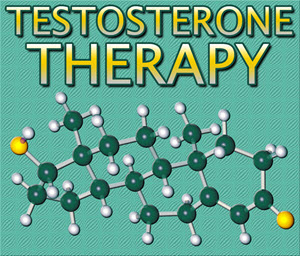Testosterone is often cast as the manly hormone, the chemical bestower of masculinity, and the reason for men's high sex drives. But new research turns this conventional wisdom on its head.
In healthy men, it turns out that testosterone  isn't linked to sexual desire at all. And in women, high testosterone is actually associated with less interest in sex with a partner.
isn't linked to sexual desire at all. And in women, high testosterone is actually associated with less interest in sex with a partner.
Complicating the picture further, while high-testosterone women may be less interested in slipping between the sheets with a lover, high testosterone is linked to greater interest in masturbation in healthy women, according to research detailed online in May in the journal Archives of Sexual Behavior.
The findings are unique because most studies of sexual desire and hormones use either animal subjects or focus on people with abnormally low or high testosterone who come into clinics for treatment, said study researcher Sari van Anders, a behavioral neuroendocrinologist at the University of Michigan. Healthy individuals are rarely studied, van Anders told LiveScience.
"People have argued that sex research focuses too much on dysfunction and pharmaceutical treatment as opposed to questions like pleasure or relationships or stress," van Anders said. "There is a whole scope of factors that go unstudied."
Delving into desire
When people do study factors such as stress and body image regarding people's sex lives, they rarely look at hormonal influences at the same time. That's what van Anders did differently.
She recruited volunteers from university classes and community fliers to fill out questionnaires on their relationships, their stress and moods, and their own feelings about their bodies and sexuality.
These questions were designed to get at factors that influence people's sex lives: How happy are you, generally? How stressed? Are you self-conscious about your body during sex?
The 196 volunteers (105 men and 91 women) also answered questions about how frequently they had partnered sex and masturbated, and how often they had the desire to masturbate or to have sex with a partner.
desire to masturbate or to have sex with a partner.
People tend to think of desire as a single phenomenon, but the desire to have sex may come from a different place than the urge to masturbate, van Anders said.
"When you're feeling sexual desire for a partner there might be other factors that play into that, for example, how you felt about that partner that day, how attracted you feel to that partner, how attractive you feel to that partner, your relationship and things like that," van Anders said. [6 Great Things Sex Can Do For You]
Solitary desire, on the other hand, might be more internal and less influenced by social factors like relationship satisfaction, she said.
Testosterone and libido
Each study participant gave a saliva sample for hormonal analysis. Van Anders measured testosterone as well as cortisol, a hormone released in times of stress (a surefire libido-killer).
She then compared low-versus-high testosterone participants and their self-reported levels of desire. In men, she found, levels of testosterone had nothing to do with how much guys thought about sex, solitary or partnered.
Multiple studies have found that men generally desire sex more frequently than women. And men also produce more testosterone than women.
These two facts have led to the belief that testosterone is the reason for the desire, van Anders said. But that idea is based on animal studies and studies of men who produce extreme, abnormally low levels of testosterone. In men in the healthy range, an extra spurt of the "macho hormone" doesn't seem to influence interest in getting busy.
"In this regular, healthy range of testosterone, it's high enough that the variations aren't what's driving any changes," van Anders said. (There have been studies, though very few, showing similar results.)
Things get a bit more complicated on the female side. Women with higher testosterone reported less desire for partnered sex. It may seem strange, but the  finding fits with previous evidence, van Anders said.
finding fits with previous evidence, van Anders said.
For example, women in long-term relationships have been shown to have lower testosterone. It could be that their partner's desire relates to a need to be close and connected as opposed to merely a need for pleasure, van Anders said.
Alternatively, higher testosterone might reflect higher stress in women. Testosterone is secreted by the adrenal glands, which go into overdrive during stressful times.
Solitary sexual desire, on the other hand, was higher in the higher-testosterone women, such that the 27 women in the study who reported no desire to masturbate at all had lower testosterone than the women who said they sometimes felt the urge to masturbate.
The finding bolsters the idea that craving for a partner is more influenced by social factors, van Anders said, while solitary desire is more innate.
Gender differences
Next, van Anders looked into the burning question of why men, on average, want sex more often than the average woman. Sure enough, she found that testosterone was not the culprit. Levels of this hormone did not explain the differences in desire between men and women.
The only factor that did link to gender differences was masturbation. Men masturbated more than women and reported more sexual desire (with a partner and solitary). Women masturbated less and reported less desire.
There's no way to tell from this research whether the desire or the masturbation comes first. But there are intriguing hints that perhaps the difference in masturbation habits could explain the desire gap, van Anders said. Sex therapists often tell low-desire patients to try starting sex or masturbation even if they feel uninterested. Usually, the desire follows.
Though female masturbation has become less taboo, it is still somewhat stigmatized compared to male masturbation, van Anders said. It's possible that women simply don't practice revving up their desires as much as men do.
"The idea is that if women don't feel comfortable with their genitals and masturbating, and if they don't think it's okay and refrain from doing it and don't express their desires, after a while, the desire might change as well," van Anders said.
The next step, van Anders said, is to get a better handle on the concept of desire, focusing on social factors and not just pharmaceutical fixes for low libidos. People often think that the desire comes first and drives people to seek out sexual pleasure, she said.
focusing on social factors and not just pharmaceutical fixes for low libidos. People often think that the desire comes first and drives people to seek out sexual pleasure, she said.
In reality, passion is a lot like hunger, she said. You might eat because you're starving, or because you're bored, or because it's 6:30 p.m. and that's when you have dinner.
"When you're saying you desire sexuality with another person, what are you desiring, and are people desiring different things sometimes?" van Anders said. "Are some people more desiring to be with their partner, to give their partner pleasure, to have a routine, or for their own pleasure?"
Reference
BUSTED: Myths About Testosterone And Its Link To Sexual Desire In Men And Women
Contact Us Today For A Free Consultation

- Adverse Effects of Testosterone Therapy in Adult Men: A Systematic Review and Meta-Analysis [Last Updated On: July 2nd, 2024] [Originally Added On: June 4th, 2010]
- Low Testosterone Levels, Foods That Increase Testosterone Levels wwwSelf-Improvement-Bible.com [Last Updated On: November 12th, 2023] [Originally Added On: May 30th, 2011]
- Low Testosterone in Men: The Next Big Thing in Medicine! - Abraham Morgentaler, MD [Last Updated On: May 7th, 2023] [Originally Added On: June 3rd, 2011]
- How To Determine Testosterone Levels By Looking At Your Ring Finger [Last Updated On: December 7th, 2017] [Originally Added On: June 30th, 2011]
- Prolab Horny Goat Weed Testosterone Booster Supplement Review [Last Updated On: November 23rd, 2023] [Originally Added On: July 19th, 2011]
- The Healthy Skeptic: Products make testosterone claims [Last Updated On: August 13th, 2024] [Originally Added On: September 11th, 2011]
- How To Naturally Increase Testosterone [Last Updated On: November 21st, 2023] [Originally Added On: September 28th, 2011]
- Testosterone Production - Video [Last Updated On: November 25th, 2024] [Originally Added On: November 20th, 2011]
- Testosterone makes us less cooperative and more egocentric, study finds [Last Updated On: January 23rd, 2018] [Originally Added On: February 1st, 2012]
- Testosterone makes us less cooperative and more egocentric [Last Updated On: January 24th, 2018] [Originally Added On: February 1st, 2012]
- Too much testosterone makes for bad decisions, tests show [Last Updated On: April 30th, 2025] [Originally Added On: February 1st, 2012]
- Today in Research: Testosterone's Negative Effects; Diet Soda Death [Last Updated On: January 2nd, 2018] [Originally Added On: February 2nd, 2012]
- Testosterone drives ego, trips cooperation [Last Updated On: December 2nd, 2017] [Originally Added On: February 4th, 2012]
- FDA approves BioSante/Teva's testosterone gel [Last Updated On: April 28th, 2025] [Originally Added On: February 15th, 2012]
- 'Manly' Fingers Make For Strong Jawline in Young Boys [Last Updated On: December 1st, 2017] [Originally Added On: February 15th, 2012]
- Teva, BioSante Win U.S. Approval for Testosterone Therapy [Last Updated On: December 10th, 2017] [Originally Added On: February 15th, 2012]
- BioSante Gains on Approval of Testosterone Gel: Chicago Mover [Last Updated On: January 8th, 2018] [Originally Added On: February 16th, 2012]
- BioSante soars following drug approval from FDA [Last Updated On: December 26th, 2017] [Originally Added On: February 16th, 2012]
- Antibodies, Not Hard Bodies: The Real Reason Women Drool Over Brad Pitt [Last Updated On: December 24th, 2017] [Originally Added On: February 21st, 2012]
- Almark Publishing Releases Book From Mark Rosenberg, M.D. Revealing Natural Discoveries Associated With Low ... [Last Updated On: May 3rd, 2025] [Originally Added On: February 28th, 2012]
- Testosterone Replacement Clinic Comes to Kansas City with Potential to Help Thousands of Men [Last Updated On: May 2nd, 2025] [Originally Added On: March 1st, 2012]
- Study examines the relative roles of testosterone and its metabolite, dihydrotestosterone in men [Last Updated On: December 2nd, 2017] [Originally Added On: March 7th, 2012]
- The Role of 5{alpha}-Reductase Inhibition in Men Receiving Testosterone Replacement Therapy [Editorial] [Last Updated On: December 21st, 2017] [Originally Added On: March 7th, 2012]
- Effect of Testosterone Supplementation With and Without a Dual 5{alpha}-Reductase Inhibitor on Fat-Free Mass in Men ... [Last Updated On: January 3rd, 2018] [Originally Added On: March 7th, 2012]
- Why We Like Men Who Can Keep Their Cool [Last Updated On: December 30th, 2017] [Originally Added On: March 7th, 2012]
- Testosterone And Heart Health [Last Updated On: May 1st, 2025] [Originally Added On: March 10th, 2012]
- Your Life on Testosterone: Overly Sure of Yourself, Unwilling to Listen [Last Updated On: November 25th, 2018] [Originally Added On: March 15th, 2012]
- Mayo Clinic-TGen study role testosterone may play in triple negative breast cancer [Last Updated On: December 8th, 2017] [Originally Added On: March 23rd, 2012]
- A dose of testosterone might not cure what ails you [Last Updated On: January 23rd, 2018] [Originally Added On: March 25th, 2012]
- Green tea could aid athletes hide testosterone doping [Last Updated On: December 16th, 2017] [Originally Added On: March 25th, 2012]
- TGen Study Role Testosterone May Play in Triple Negative Breast Cancer [Last Updated On: December 6th, 2017] [Originally Added On: March 26th, 2012]
- Testosterone low, but responsive to competition, in Amazonian tribe [Last Updated On: January 23rd, 2018] [Originally Added On: March 28th, 2012]
- Competition-linked bursts of testosterone are fundamental aspect of human biology, study of Amazonian tribe suggests [Last Updated On: December 25th, 2017] [Originally Added On: March 28th, 2012]
- Playing football boosts testosterone levels by 30 percent! [Last Updated On: February 4th, 2024] [Originally Added On: March 28th, 2012]
- Testosterone low, but responsive to competition, in Amazonian tribe -- with slideshow [Last Updated On: December 9th, 2017] [Originally Added On: March 28th, 2012]
- The benefits of testosterone pellet therapy [Last Updated On: January 24th, 2018] [Originally Added On: March 29th, 2012]
- Low testosterone levels cause health woes [Last Updated On: November 25th, 2018] [Originally Added On: March 30th, 2012]
- Heart Failure Patients Getting Relief from Testosterone Supplements [Last Updated On: May 5th, 2025] [Originally Added On: April 21st, 2012]
- Study Finds Fatherhood Suppresses Testosterone [Last Updated On: May 4th, 2025] [Originally Added On: May 3rd, 2012]
- Low testosterone levels could raise diabetes risk for men [Last Updated On: January 26th, 2018] [Originally Added On: May 5th, 2012]
- Why low testosterone may increase your risk of diabetes [Last Updated On: November 25th, 2024] [Originally Added On: May 5th, 2012]
- Diabetes link to low testosterone [Last Updated On: November 25th, 2024] [Originally Added On: May 5th, 2012]
- Testosterone Linked to Weight Loss in Obese Men [Last Updated On: January 2nd, 2018] [Originally Added On: May 11th, 2012]
- Testosterone may help weight loss [Last Updated On: November 25th, 2024] [Originally Added On: May 11th, 2012]
- Testosterone-fuelled infantile males might be a product of Mom's behaviour [Last Updated On: December 25th, 2017] [Originally Added On: May 11th, 2012]
- Testosterone-fueled infantile males might be a product of Mom's behavior [Last Updated On: January 6th, 2018] [Originally Added On: May 11th, 2012]
- Testosterone supplements may help obese men lose weight [Last Updated On: January 5th, 2018] [Originally Added On: May 11th, 2012]
- Testosterone supplements 'can help men lose their middle-aged spread' [Last Updated On: November 25th, 2024] [Originally Added On: May 12th, 2012]
- Some doctors question safety of testosterone replacement therapy [Last Updated On: January 20th, 2018] [Originally Added On: May 15th, 2012]
- Health Canada Approves New Testosterone Topical Solution for Men [Last Updated On: May 15th, 2025] [Originally Added On: May 15th, 2012]
- Environment trumps genes in testosterone levels, study finds [Last Updated On: May 8th, 2025] [Originally Added On: May 15th, 2012]
- Global Testosterone Replacement Therapy (TRT) Industry [Last Updated On: May 7th, 2025] [Originally Added On: May 21st, 2012]
- Testosterone Fuels Boom, Swindler Sows Panic: Top Business Books [Last Updated On: January 13th, 2018] [Originally Added On: June 2nd, 2012]
- Increase in testosterone drug use [Last Updated On: April 12th, 2018] [Originally Added On: June 4th, 2012]
- Testosterone Promotes Agression Automatically [Last Updated On: January 29th, 2018] [Originally Added On: June 9th, 2012]
- Testosterone shown to help sexually frustrated women [Last Updated On: January 27th, 2018] [Originally Added On: June 9th, 2012]
- Research and Markets: Testosterone Replacement Therapy (TRT) - Global Strategic Business Report [Last Updated On: December 23rd, 2017] [Originally Added On: June 12th, 2012]
- Proposed testosterone testing of some female olympians challenged by Stanford scientists [Last Updated On: January 30th, 2018] [Originally Added On: June 14th, 2012]
- Testosterone Makes Bosses Into Jerks, Says Paul Zak [Last Updated On: January 8th, 2018] [Originally Added On: June 14th, 2012]
- Testosterone Therapy: A Misguided Approach to Erectile Dysfunction (ED) [Last Updated On: May 10th, 2025] [Originally Added On: June 20th, 2012]
- New drugs, new ways to target androgens in prostate cancer therapy [Last Updated On: January 8th, 2018] [Originally Added On: June 20th, 2012]
- Long-term testosterone treatment for men results in reduced weight and waist size [Last Updated On: January 19th, 2018] [Originally Added On: June 23rd, 2012]
- Declining testosterone levels in men not part of normal aging, study finds [Last Updated On: December 27th, 2017] [Originally Added On: June 23rd, 2012]
- Low testosterone not normal part of aging [Last Updated On: December 22nd, 2017] [Originally Added On: June 25th, 2012]
- Testosterone Does Not Necessarily Wane With Age [Last Updated On: December 6th, 2017] [Originally Added On: June 25th, 2012]
- Overweight men can boost low testosterone levels by losing weight [Last Updated On: December 10th, 2017] [Originally Added On: June 25th, 2012]
- Testosterone-replacement therapy improves symptoms of metabolic syndrome [Last Updated On: January 14th, 2018] [Originally Added On: June 26th, 2012]
- Testosterone therapy takes off pounds [Last Updated On: December 11th, 2017] [Originally Added On: June 26th, 2012]
- Weight loss may boost men's testosterone [Last Updated On: May 9th, 2025] [Originally Added On: June 27th, 2012]
- Low Testosterone? Study finds age may not be to blame [Last Updated On: May 12th, 2025] [Originally Added On: July 1st, 2012]
- Do you have low testosterone? [Last Updated On: December 15th, 2017] [Originally Added On: July 8th, 2012]
- Wall Streeters Buying Testosterone for an Edge [Last Updated On: May 11th, 2025] [Originally Added On: July 12th, 2012]
- Beefy Wall Street Traders rub on testosterone [Last Updated On: February 20th, 2024] [Originally Added On: July 12th, 2012]
- Tale of two runners exposes flawed Olympic thinking [Last Updated On: December 23rd, 2024] [Originally Added On: July 19th, 2012]
- Genetic markers for testosterone and estrogen level regulation identified [Last Updated On: January 6th, 2018] [Originally Added On: July 20th, 2012]
- BUSM researchers identify genetic markers for testosterone, estrogen level regulation [Last Updated On: December 18th, 2017] [Originally Added On: July 20th, 2012]
- DRS. OZ AND ROIZEN: How to reap the benefits of normal testosterone levels [Last Updated On: December 23rd, 2024] [Originally Added On: July 21st, 2012]
- How Testosterone Drives History [Last Updated On: December 24th, 2024] [Originally Added On: July 22nd, 2012]
- Testosterone replacement is "fountain of youth" for men [Last Updated On: January 3rd, 2018] [Originally Added On: July 27th, 2012]
- Pill for low testosterone in men heads for phase II clinical trials [Last Updated On: December 31st, 2017] [Originally Added On: August 2nd, 2012]
Word Count: 1132




















